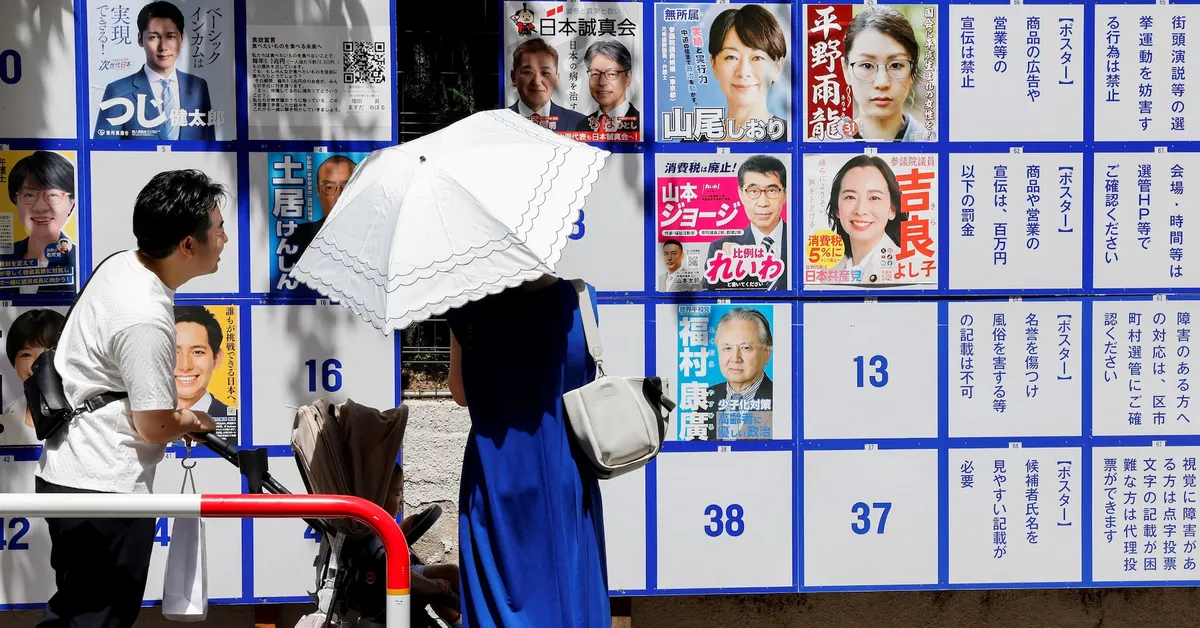
In a significant political development, Japan's ruling coalition appears poised to lose its majority in the upper house, according to exit polls released following the election held on Sunday, July 20. This outcome could signal a period of political turmoil as the nation approaches a critical tariff deadline with the United States.
While the recent ballot does not directly determine the fate of Prime Minister Shigeru Ishiba's fragile minority government, it adds substantial pressure on the beleaguered leader. Ishiba's administration has already faced challenges, having lost control of the more powerful lower house in October of the previous year.
The Prime Minister's Liberal Democratic Party (LDP) and its coalition partner, Komeito, required a minimum of 50 seats to maintain control of the 248-seat upper chamber. However, the exit poll conducted by public broadcaster NHK suggests they are likely to secure only between 32 to 51 seats, while other media outlets predict a holding of around 41 to 43 seats.
If the coalition manages to retain less than 46 seats, this would signify its worst electoral performance since the coalition's inception in 1999. This comes on the heels of the LDP's most disappointing outcome in 15 years during the lower house elections, which has left Ishiba's administration vulnerable to potential no-confidence motions and internal calls for a leadership change.
Exit polls indicate that opposition parties, which are advocating for tax cuts and stricter immigration policies, are likely to gain ground in this election. A major concern for voters has been the rising consumer prices, particularly the notable increase in the cost of staple items like rice.
David Boling, a director at the consulting firm Eurasia Group, remarked that the LDP was mostly on the defensive during this election cycle, particularly regarding key voter issues. Polls reveal that a significant majority of households are in favor of a reduction in the consumption tax to combat inflation, a stance that the LDP has opposed. This has allowed opposition parties to capitalize on public sentiment and push their agenda effectively.
The LDP has been advocating for fiscal restraint, especially with the volatile nature of the government bond market causing investor concerns about Japan's ability to manage its substantial debt, the largest in the world. Compounding these challenges, Japan is under pressure to negotiate a trade deal with the United States by August 1. Failure to do so could result in punitive tariffs being imposed on its largest export market.
One of the notable successes in this election appears to be the populist Sanseito party, which is projected to gain between 10 to 15 seats, a significant increase from the single seat it previously held. The party's platform, which emphasizes a 'Japanese First' approach and raises alarms about perceived threats from foreign influences, has brought previously fringe political rhetoric into the mainstream.
Yu Nagai, a 25-year-old graduate student who voted for Sanseito, expressed his sentiments about the political landscape, stating, "I am attending graduate school but there are no Japanese around me. All of them are foreigners. When I look at the way compensation and money are spent on foreigners, I think that Japanese people are a bit disrespected."
This election outcome not only reshapes the political landscape in Japan but also highlights the growing concerns among voters regarding economic stability, representation, and national identity.
Reporting by Tim Kelly, Mariko Katsumura, and Rikako Maruyama; Writing by John Geddie; Editing by Clarence Fernandez, Edmund Klamann, Toby Chopra, and Susan Fenton.